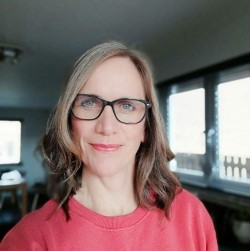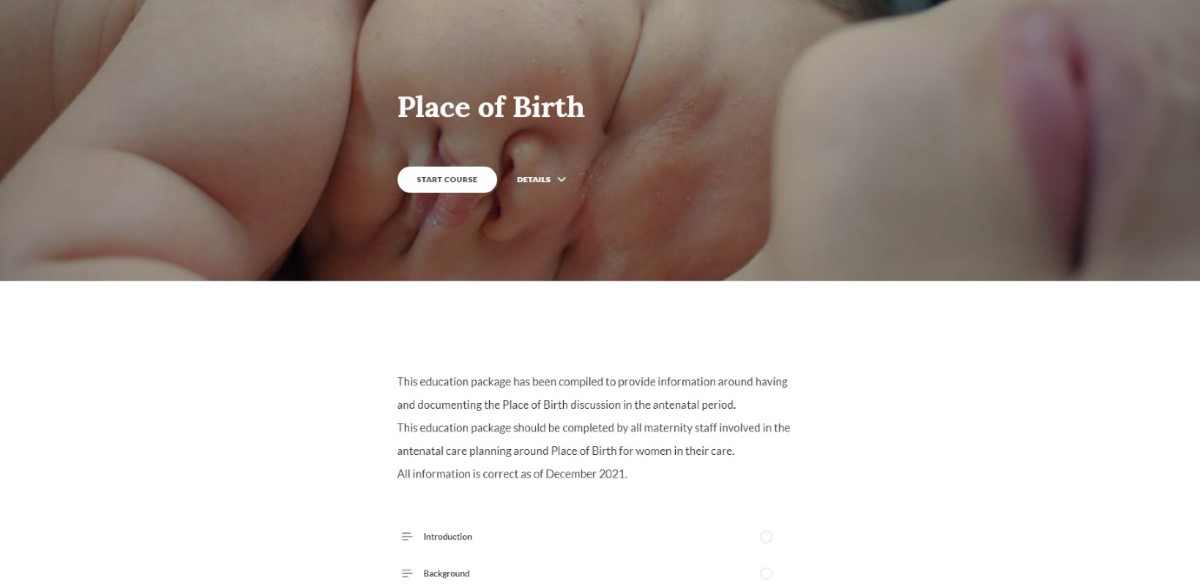Reflecting on the Place of Birth Project in NHS Grampian
Published: 14/02/2022 15:43
Article by Debbie McWilliam, Project Lead, Neonatal Midwife
Dr Gray's Hospital, NHS Grampian
I am going to begin with a quote made popular by the magnificent Maya Angelou “People will forget what you said, people will forget what you did, but people will never forget how you made them feel”.
I’m sure that you can relate to this quote, we all can both in our personal and professional lives, it’s those moments that stay with us, the heart-warming ones and the sad ones. By utilising the principles of Realistic Medicine, particularly building a personalised approach to care and changing our style to shared decision making, we can make sure that this quote resonates positively with those we care for.
The work I am going to tell you about was commissioned following a service review within NHS Grampian maternity services in 2020. One of the findings was that discussions regarding place of birth were not being documented in women’s electronic records (EPR). Women interviewed as part of the review stated that they felt uninformed of their place of birth choices, with little written evidence regarding discussions regarding place of birth and/ or any discussions around the potential for transfer. The confusion, miscommunication and uncertainty regarding their options, had the potential to cause increase in stress and anxiety in labour and postnatally for new mothers and their families. This could have been avoided if these discussions had taken place during the antenatal period, and been clearly documented. Educating and supporting midwives to have person-centred discussions, and complete the subsequent documentation, would ensure that all involved in the care of the woman, were aware of her informed choice surrounding her chosen place of birth. This would also enable women to participate in their own care planning, make their own informed decisions regarding where they would like to give birth to their baby and in turn helping them to feel more involved, supported, and empowered as a result.
Maternity services are evolving as with all areas of healthcare to promote a more innovative model of patient-centred care - gone are the days of ‘doctor knows best’.
So, why are these discussions important, you may ask?
- To share with women all their options
- To raise awareness and give an informed choice by providing information around the various places where they can choose to birth – including home, midwife-led unit, or consultant-led unit.
- To provide clarity - by sharing this information with women we are providing clarity, not confusion of where they can choose to give birth
- Shared decision-making ensures women are comfortable with their place of birth decision. This will lead to a more relaxed, confident approach to labour and birth knowing that they are in the place of their choosing, and being fully informed if this changes.
When looking at local and national feedback, women said they would rather talk about their options for place of birth early in their pregnancy to help alleviate any worries they might have about where they could birth their baby. The aim of this project was initially to educate and support midwives to provide women with evidence-based information regarding place of birth option in Grampian. There are seven community midwifery teams in Grampian who meet with women throughout their pregnancy, providing most aspects of their antenatal care. For those of you familiar with QI work, you will know the key to success is to start small tests of changes and then increase participation as time goes on.
For this change in practice to be successful, a uniformed approach was required to tackle unwarranted variation in practice and outcomes. The key to the success of this project for me was to give individual feedback to the midwives involved and provide the whole team feedback so that everyone was kept informed on what was happening within their team. There were many challenges along the way – working remotely from home during the Covid-19 pandemic, and not being able to visit the maternity units in person posed its own unique set of challenges. However, Microsoft Teams became my new closest friend! I got very used to speaking to people via video call and it increased my accessibility across a large geographical area.
The results showed an increase of 75-80% improvement in documentation around Place of Birth, with feedback from the participating midwives evidencing that they were more aware of the importance of explaining place of birth options to the women in their care. They felt their confidence in having these discussions grew as the project progressed and documentation of the discussions became second nature.
Below you can see how the principles of Realistic Medicine are embedded in the very foundations of this work.
Building a personalised approach to patient care - no blanket approach, not using defined pathways to pre-determine where a woman should give birth – putting an informed choice back into their hands
Changing style to shared decision making - working with women and families to provide the information necessary for them to reach their own decision regarding their place of birth
Reducing harm and waste - reducing unnecessary stress during labour by fully informing women prior of the potential reasons for transfer in labour and how this would be facilitated
Tackling unwarranted variation in practice and outcomes - by making it second nature to discuss all options with all women in all three trimesters, and documenting this in one pre-determined place to allow all carers to access details of place of birth discussions.
Managing risk better – the process of truly shared decision-making isn’t about ‘ignoring’ risk in the decision-making process. It is very much about recognising this, giving unbiased, evidence-based information to support women to make the best decision for her and her family safely
Becoming improvers and innovators in healthcare - as previously mentioned, healthcare is evolving with Realistic Medicine at the forefront of all care, and within Maternity Services women have the ability to shape their own birth experience in a fully informed manner
As my year comes to an end as Project Lead the project will now come to life as an Education Package available to all staff in Grampian.

The records will continue to be audited by the teams involved, and the local community teams are embracing and sustaining the amazing results.
I have learned a lot about communication and person-centred care and it has opened my eyes to the wider world of Quality Improvement, Realistic Medicine, and holistic practices to ensure that women and their families are at the very centre of their care through their pregnancy, labour, birth and beyond.
